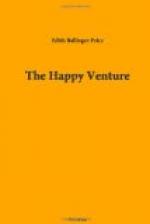TALES IN THE RAIN
“’How should I your true love know,
From another one?
By his cockle hat and staff,
And his sandal shoon...’”
It was the fourth time that Felicia, at the piano, had begun the old song. Kenelm uncurled his long legs, and sat up straight on the window-seat.
“Why on earth so everlasting gloomy, Phil?” he said. “Isn’t the rain bad enough, without that dirge?”
“The sky’s ‘be-weeping’ him, just the way it says,” said Felicia. She made one complete revolution on the piano-stool, and brought her strong fingers down on the opening notes of another verse.
“’He is dead and gone, ladie,
He is dead and—’”
Kenelm sat down again in the window-seat. He knew that Felicia was anxious about their mother, and he himself shared her anxiety. The queer code of fraternal secrecy made him refrain from showing any sign of this to his sister, however. He yawned a little, and said, rather brusquely:
“This rain’s messing up the frost pretty well. There shouldn’t be much left of it by now.”
“Crocuses soon ...” Felicia murmured. She began humming to an almost inaudible accompaniment on the piano:
“‘Ring, ting, it is the merrie springtime....’”
The rain rolled dully down the clouded window-panes and spattered off the English-ivy leaves below the sill. They quivered up and down on pale stems—bright, waxed leaves, as shining as though they had been varnished.
Kirk drifted in and made his way to Felicia.
“She’s better,” he observed. “She said she was glad we were having fun.” He frowned a little as he ran his finger reflectively down Felicia’s sleeve. “But she’s bothered. She has think-lines in her forehead. I felt ’em.”
“You have a think-line in your own forehead,” said Felicia, promptly kissing it away. “Don’t you bother.”
“Where’s Ken?” Kirk demanded.
“In the window-seat.”
Thither Kirk went, a tumble of expectancy, one hand before him and his head back. He leaped squarely upon Ken, and made known his wishes at once. They were very much what Kenelm expected.
“See me a story—a long one!”
“Oh, law!” Kenelm sighed; “you must think I’m made of ’em. Don’t crawl all over me; let me ponder for two halves of a shake.”
Kirk subsided against his brother’s arm, and a “think-line” now became manifest on Kenelm’s brow.
“See me a story”—Kirk’s own queer phrase—had been the demand during most of his eight years. It seemed as though he could never have enough of this detail of a world visible to every one but himself. He must know how everything looked—even the wind, which could certainly be felt, and the rain, and the heat of the fire. From the descriptions he had amassed through his unwearied questioning, he had pieced out for himself a quaint little world of color and light,—how like or unlike the actuality no one could possibly tell.




